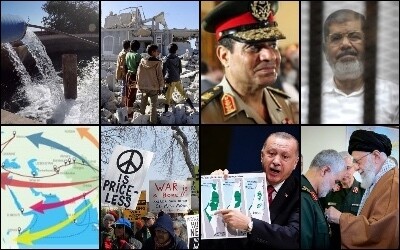Eight trends, most of them negative. |
As ever, the Middle East is monumentally in flux. As usual, most developments are negative. Here’s a guide:
Water replaces petroleum as the key liquid: Oil and gas still provide nearly 60 percent of the world’s energy, but this number is declining and even the wealthiest oil producers are feeling the pinch (“GCC states look to new taxes as oil revenues remain weak”). Contrarily, tensions over water are becoming a major source of international tensions (e.g., Turkey vs. Syria, Ethiopia vs. Egypt) and a driving force of domestic change (the Syrian revolt of 2011). It’s also a potential cause of massive migration; a former Iranian minister of agriculture predicts that water shortages will force up to 70 percent of the country’s population, or 57 million Iranians, to emigrate.
Anarchy replaces tyranny: Of course, some tyrannies remain, notably in Turkey and Iran, but anarchy has become the region’s greater bane, including whole countries (Libya, Yemen, Syria) and parts of others (e.g., Sinai). Though generally less threatening to the outside world, anarchy is an even more miserable personal experience than tyranny, for it lacks guidelines. As a thirteenth century Koran scholar noted, “A year of the sultan’s tyranny does less harm than a moment of the people’s anarchy.”
Efforts to overthrow the old order have had few beneficial consequences. |
The failure of Arab youths’ efforts to make improvements: Around 1970, many Arabic-speaking countries began an era of corrupt strongman rule. Starting in Tunisia in December 2010, efforts to overthrow the old order have shaken governments but had few beneficial consequences. In some cases (Libya, Yemen, Syria), they led to civil war; in another (Egypt), they merely brought on a younger strongman. Recent uprisings in Algeria, Sudan, Iraq, and Lebanon have yet to conclude but odds are, they too will end badly.
The decline of Islamism: After peaking in about 2012, the radical attempt to apply Islamic law severely and in full has lost ground in the Middle East. Several factors account for this: a fear of wild-eyed fanatics like Boko Haram, Shabaab, ISIS, and the Taliban; the dismal experience of Muslim peoples who have lived under Islamist rule (e.g., Egypt in 2012-13); and the fracturing of Islamists (e.g., in Syria) into competing and hostile factions. What might come after Islamism is unclear, but after a century of failure with it and other extremist ideologies (including fascism and communism), an era of anti-ideology might lie ahead.
Governments that once treated Israel as the archenemy now work with it. |
Iran is the most divisive country, not Israel: For decades, the issue of the Jewish state drove and divided Middle East politics; now, it’s Iran. The Islamic Republic dominates four Arab capitals (Baghdad, Damascus, Beirut, and Sanaa), aggresses elsewhere, and spreads its radical version of Islam. Governments that once treated Israel as the archenemy, notably Saudi Arabia, now work with it in a range of ways, overt and covert. As a side note, the global Left has inherited the Arab states’ old toxic anti-Zionism; Israel now enjoys better relations with Saudi Arabia than with Spain or Sweden.
Iran and Turkey take up the Arab states’ anti-Zionism: The era of Arab state warfare on Israel lasted only 25 years, 1948-73, and ended 46 years ago because politicians found this conflict too expensive and risky. Instead, they abandoned it to sub-state actors like the Palestinians. Eager to take up the slack, Iran’s Khomeini and Turkey’s Erdoğan made opposition to Israel central to their messages. If so far, they have mostly limited their aggression to words, that could dramatically change.
More Americans find war excessively costly and adventurous. |
Americans react against over-involvement: George W. Bush began nearly simultaneous wars in Afghanistan and Iraq that many Americans found excessively costly and adventurous, prompting a long-term backlash. Barack Obama and Donald Trump each responded in characteristic ways (one critical of the United States, the other boisterously nationalist) to reduce U.S. military commitments in the region. Obama’s 2012 red-line retreat and Trump’s 2019 pulling of soldiers, both involving Syria, symbolize this retreat.
Russia makes noise but China builds: Vladimir Putin seems to be everywhere – closing commercial deals, selling arms, sending troops, convening conferences – but these are the pyrotechnics of a power in decline. Meanwhile, Xi Jinping’s China quietly builds its economic infrastructure, a network of political alliances, and military power in the region, to be called upon whenever Beijing decides to exert its will. Beijing, not Moscow, poses the great threat.
One piece of unabashed good news (Islamism’s decline) stands out among these many and protracted problems.
Daniel Pipes is president of the Middle East Forum.








